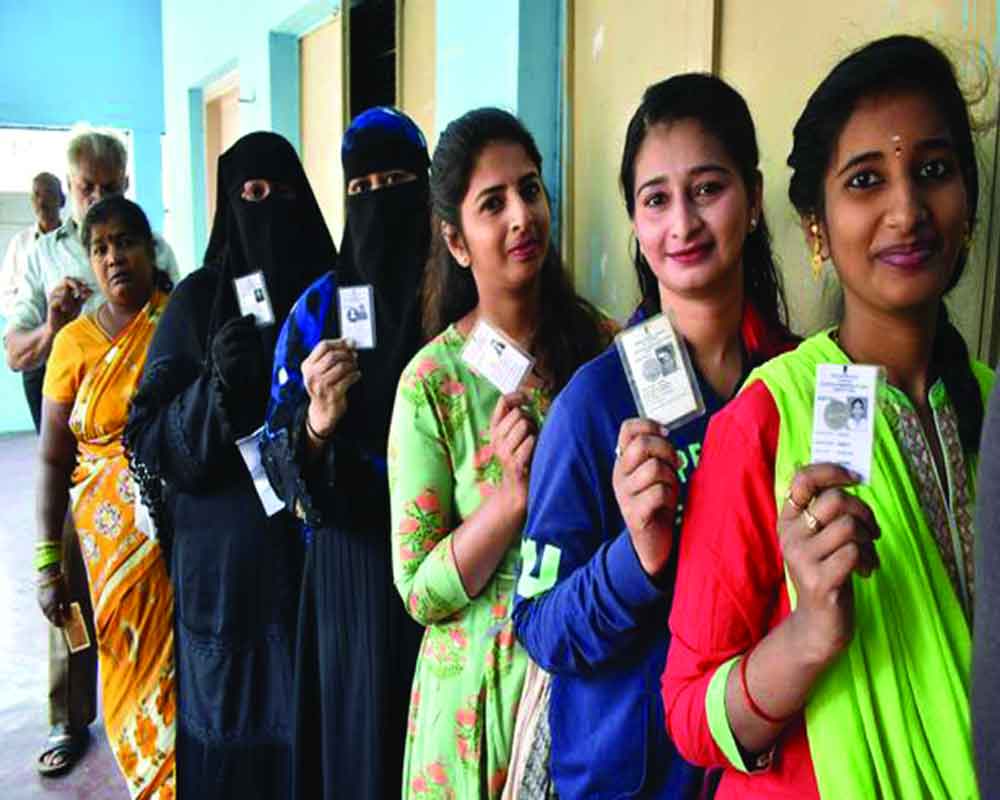With a burgeoning number of female voters, women stand poised to wield significant influence in the upcoming general elections
Can Women voters decide the upcoming 2024 General elections? Their growing number of voters and favourable legislation, such as the one-third reservation for women in Parliament and legislatures, make them an important segment. Political parties are trying to attract women voters, a critical segment. To do this, they are offering various benefits. According to a recent report, the high turnout of women voters could significantly impact the 2024 elections. The report predicts that by 2047, women’s voter turnout may reach 55 per cent, while men’s turnout could decrease to 45 per cent.
It is worth noting that B.R. Ambedkar, the father of the Indian Constitution, once stated that “Political power is the key to all social progress.” This statement holds today, as women cannot expect to receive justice unless they have a say in decision-making processes. Women in India are demanding more measures to remove gender bias. Last September, the Parliament passed the Women’s Reservation Bill to empower women. This bill ensures a 33 per cent reservation for them in Parliament and state legislatures. Both the Congress and the BJP claimed credit for the bill’s passage. Congress leader Sonia Gandhi said, “It is our bill.” 2008, Sonia Gandhi passed it in the Upper House but failed to do so in the Lok Sabha. Last September, PM Modi introduced this bill with pride and it passed almost unanimously after 27 years. Due to the delay in the census and delimitation process, the bill will be implemented only after four years.
Since gaining independence, India has had only one woman Prime Minister and 15 women Chief Ministers. However, the number of women contesting elections has increased sevenfold since the 1950s and women’s representation in the Lok Sabha has risen from 5 per cent to 15 per cent. The situation is similar globally. According to the Inter-Parliamentary Union, women comprise roughly 26 per cent of lawmakers worldwide. In Rwanda, on the other hand, women hold more than 60 per cent of seats. In 2008, Rwanda became the first country to have a female-majority parliament. Women hold only 14 per cent of parliamentary seats in India. There are 78 and 24 women members in the Lok Sabha and Rajya Sabha, respectively. India ranks 149th among 193 nations regarding women’s representation in the lower house of the Parliament. Moreover, less than 16 per cent of MLAs in each state of India are women.
One significant measure in India was that in 1993, one-third of Panchayat seats were reserved for women, which has now been expanded to 50 per cent in most states. Nearly a million women serve as sarpanches at the grassroots level. These sarpanches could climb up the ladder with their gross root experience. The upcoming General Elections will have 96.88 crore voters, with over 47 crore being women. 1.41 crore of the 2.63 crore new voters are female. More women have registered to vote in Kerala, Telangana, Tamil Nadu, Puducherry, Goa, Andhra Pradesh, Manipur, Meghalaya, Mizoram and Nagaland.
Despite the passage of the Women’s Reservation Bill, the participation of women in politics has not significantly increased. While political parties supported the bill, they only allocated a small percentage of their tickets to women, typically 10-15 per cent in the recent Assembly polls. For the 2024 Lok Sabha polls, BJP granted only 67 tickets to women out of 421 candidates in the upcoming Lok Sabha polls. However, some chief ministers such as Mamata Banerjee, Nitish Kumar and Arvind Kejriwal have recognised the benefits of promoting women’s empowerment.
To remove the gender bias, Parties need to field more women leaders and candidates for Women’s empowerment. However, some argue that women tend to win if they come from known political families. Many leaders also do not look beyond their families to pick candidates. It’s essential to understand that not all women will vote for women candidates. Political parties should focus on addressing crucial issues rather than relying on incentives to woo voters. Many parties offer incentives to women voters but do not give women equal representation in their candidate lists. Parties should reserve at least one-third of their tickets for women as stipulated by the women’s reservation legislation. Additionally, parties should discourage the preferential treatment given to political dynasties.
Indian political parties are targeting women voters with various schemes and benefits. Congress in Karnataka offers women free bus travel and a Rs 2,000 cash incentive. In Himachal Pradesh, women aged 18-60 will receive Rs 1,500 monthly. Delhi’s ‘Mukyamantri Mahila Samman Yojna’ will provide Rs 1,000 monthly to women over 18 years. TMC in West Bengal has announced a remuneration hike. AAP and Congress offer incentives like Rs 1,000 monthly payment and Rs 1 lakh annual allowance before the Lok Sabha elections.
Political accountability towards women starts with achieving gender balance in decision-making, promoting women’s more substantial presence and influence in political parties and advancing gender equality issues in party policies and platforms. Education is also important for all these. We need governance reforms that are sensitive to gender issues. These will enable elected officials to be more responsive.
(The writer is a popular columnist; views are personal)


























